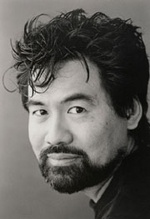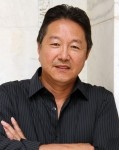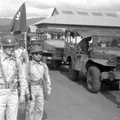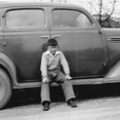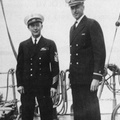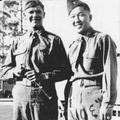Read Part 1 >>
Long Story Short
Long will also reprise her one-woman show, Surfing DNA, this June with East West Players in Los Angeles. Her performance about her own growing up in a show business family earned Long an Ovation Nomination for Best Solo Performance in 2012.
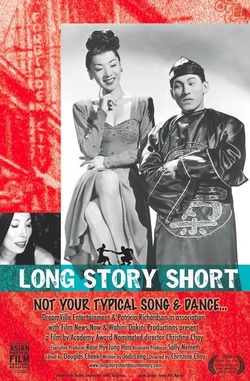
Jodi Long’s parents’, Larry and Trudie Leung, are the subject of her one-woman play and documentary video, “Long Story Short”. Courtesy of Asian American Press.
The film documentary version of Long Story Short, directed by Academy Award-nominated Christine Choy, is Long’s screenwriting debut. The film tells the same story about her vaudevillian parents as the Larry and Trudie Leung nightclub act in the 1940s. She even discovered a tape of their appearance on The Ed Sullivan Show on May 7, 1950.
The couple divorced when Jodie was a girl and she revisits those memories with her parents that were held inside for decades. Her film won the Los Angeles Asian Pacific Film Festival’s 2008 Audience Award for Best Documentary, and was voted one of the top 10 documentaries by UCLA’s Asia Institute. It is available to view online on Amazon.com.
Long’s American roots begin with her maternal grandfather coming from Japan in 1900, settled down and married a picture bride 15 years later. Her mother, Trudie Long, was born Kimiye Tsunemitsu in Portland, Oregon to Issei Japanese parents.
Even though her brother was already serving in the U.S. Army when Pearl Harbor was bombed in 1941, the Tsunemitsu family was relocated to the Minidoka Internment Camp in Idaho.
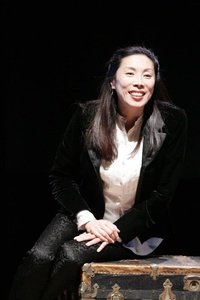
Jodi Long during a performance of her award-winning one-woman play “Long Story Short” in Los Angeles. Courtesy of Asian American Press.
“My mother got out of the camp early and was only there for about a year,” she said. “She was just 18 and took a train to only place where she could hope to find work, New York City.”
She was sponsored to work as a clerk for the American Bible Society and took a higher paying second job as a dancer at The China Doll night club.
“They paid her $75 a week, versus the $12 dollars she was getting at the American Bible Society,” Long said. “She walked into it sideways.”
Long’s father, Lawrence Long, was of Chinese-Scottish background, and the youngest of six sons born to a Chinese-Australian mother. There was a dance studio above the fruit stand where he worked as a child, and was taking lessons from age 12, and performed in the pre-war Australian vaudeville.
“Dad was a tap dancer from the music halls in Sydney,” Long said.
After serving in the Australian Navy in WWII, Lawrence was serving on a merchant ship that stopped in San Francisco. He frequented the Chinatown nightclubs and it wasn’t long before he found work and was a headline act with his stage name “Larry Leung.”
“He started out in the Forbidden City as a tap dancer,” she said. “He formed a group with Paul Wing, called the Wing Brothers, and they brought the act to New York and headlined the China Doll. That is where he met mom.”
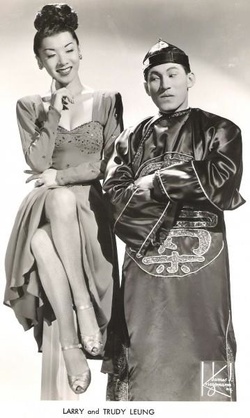
Jodi Long’s parents’, Larry and Trudie Leung, were a nightclub act in the 1940s, and performed on The Ed Sullivan Show on May 7, 1950. Courtesy of Asian American Press.
The two eventually married and formed the husband and wife act, “Larry and Trudie Leung” and worked the nightclub circuit and USO shows across the country into the 1950s. Trudie stopped performing shortly after Jodi was born in Queens, New York.
“I am still a New Yorker, born and raised,” Long said.
Lawrence went on to perform in regional theater and in the original Broadway cast of Flower Drum Song. He would later tour with the show as the male lead and director.
In the 1960s he formed his own production of East Goes West. After some difficulty with producers over creative control, Lawrence left show business and become a professional golfer in the l970s. He was a club pro at Old Tappan Golf Course in New Jersey, and served as President of the New Jersey PGA Seniors.
Long was just 7-years-old when she made her own Broadway debut in the Sidney Lumet show Nowhere to Go But Up. She was also the youngest girl in Flower Drum Song and would have toured with the show until her mother said no.
Instead, Jodie attended the High School of Performing Arts in NYC, and went on to earn a BFA from Purchase College’s Conservatory of Theater Arts & Film. She was working regional theater and off-Broadway right out of college, and a year later was cast in the Virginia Wolfe production of Loose Ends.
Long said theater is a life on the road and living hand-to-mouth. It is great training for an actor though, and says she wouldn’t have traded the experience for anything.
As a schooled Shakespearian actor Long said her education and early experience led to roles not written specifically for Asian American actors at a time when it was not commonplace. Auditioning for roles even when it was not likely going to result in a part was something she did just to get experience and to get her name and face out there.
College taught her to study characters and “not to see the ‘oh, this is not written for you’ in any role,” she said. Instead, she explored the character and how she would portray them.
“I was incredibly tenacious,” she said. “I had it in my mind that when I got out of school that I could play anything,” she said.
There was rejection but she continued doing things her own way and said the work eventually became regular.
Eventually, she said producers found non-traditional casting of actors of color to be profitable in regional and off-Broadway productions. Directors love to experiment, she added, and when it didn’t hurt ticket sales the fad became more standard practice and eventually made its way to Broadway.
One of Long’s favorite roles was “M” in the 1988 Philip Glass multimedia musical 1,000 Airplanes on the Roof, a unique piece about alien abductions with a monologue scripted by David Henry Hwang. She became the back-up lead and eventually made the role her own.
“It had actually been written for a man, and I actually auditioned as a man, with a suit and that whole thing,” Long said. “It was a really great transforming experience touring the world and I loved that show a lot.”
She appeared in the 2002 Broadway revival of Flower Drum Song, winning an Ovation Award for her performance during the Los Angeles tryout. She recently revived her role as Madame Liang in 2012.
Long has worked in five David Henry Hwang productions and says she is proud to have been instrumental in some of the seminal work of great Asian American playwrights from regional theater to off-Broadway to Broadway.
“I was there when it all happened,” Long said.
“With her immense talent, versatility, and devotion to craft, Jodi Long has been one of my most dependable collaborators over the years,” said David Henry Hwang. She can do just about anything, and do it brilliantly.”
Rick Shiomi, founder of Mu Performing Arts in Minnesota, has also worked extensively with David Henry Hwang. Although he has actually never worked with Long, he has met her and seen her perform.
“She’s a terrific talent and has been one of the leading Asian American actors of her generation,” Shiomi said.
Long was recently honored by the Chinese Historical Society of Southern California for her contributions as a Chinese American. She is also the recipient of the Los Angeles Woman’s Theater’s Maverick Award, The Titan Theater of New York’s Earthshaker Award, and a Pan Asian Rep’s Award for her work in the theater.
Some of Long’s side projects include a lead singing role with Fred Houn’s Asian American Art Ensemble. She even released a jazz album, Bamboo That Snaps Back.
Long serves on the Board of Hollywood Orchard, an education and awareness group that works to donate fresh fruit to those in need. She is also a certified trainer of Kundalini Yoga, is an animal lover, and a vegetarian who enjoys cooking.
*This article was originally published on Asian American Press on June 1, 2013.
© 2013 Asian American Press



